At the third of four dinners we were invited to attend with Donald Trump Jr. in Bali, Indonesia, he told the small group that his father, a self-proclaimed germaphobe, doesn’t enjoy shaking hands with people and always carries wet wipes used for disinfecting germs. But rather than the regular kind, he uses the ones made for electronics. “He does?” one of us quipped, “Don’t those things turn your skin orange?” The room went silent. “That’s not funny,” his closest associate scoffed. A few hours later we were politely uninvited to the fourth dinner.
How did we end up spending three days in this group before getting ostracized? We were invited by the controlling shareholder and CEO of the Indonesian company with which The Trump Organization has partnered for a real estate development in Bali. While they were assessing the progress of the projects, we were assessing the Indonesian company as a potential investment in our portfolio. Aside from seeing the assets, we had the unique opportunity to see the chief executive interact with his business partners first-hand. Traveling with him gave a unique perspective few investors ever get the chance to see.
-1.jpg) Performing on-site due diligence at a €650m real estate developer in Bali
Performing on-site due diligence at a €650m real estate developer in Bali
Finding digital growth at a cheap valuation
The CEO of the real estate development company is also a controlling shareholder and founding CEO of a diversified holding that includes a large media business, in which we invested earlier this year. In the months since our original investment, this media company has advanced its position in the digital space: it grew market share, engaged in a sizeable long-term joint venture with a digital media partner from China, and its news portal overtook Google as the most visited website in Indonesia. In addition, the founding CEO – who is seen by the market as crucial for the company’s success – has rejoined the business a few months ago after a hiatus of several years.
Despite the company’s dominant presence in Indonesia, strong recent progress and return of the founder to the helm, the market had not yet appreciated the firm’s momentum. Its P/E ratio stands at only 7x (it was at 30x five years ago), while earnings keep growing. We performed additional due diligence on the founder’s reputation and the business model, meeting with a competitor, making a site visit, liaising with fellow Wharton alumni and speaking with over a dozen sources from the local business community. As a result, we grew more confident in the strength of the company and its leadership. Given the gap between the fundamental strength and the valuation of the business, and the catalyst of the promotional founder’s return, we increased our position in this company.
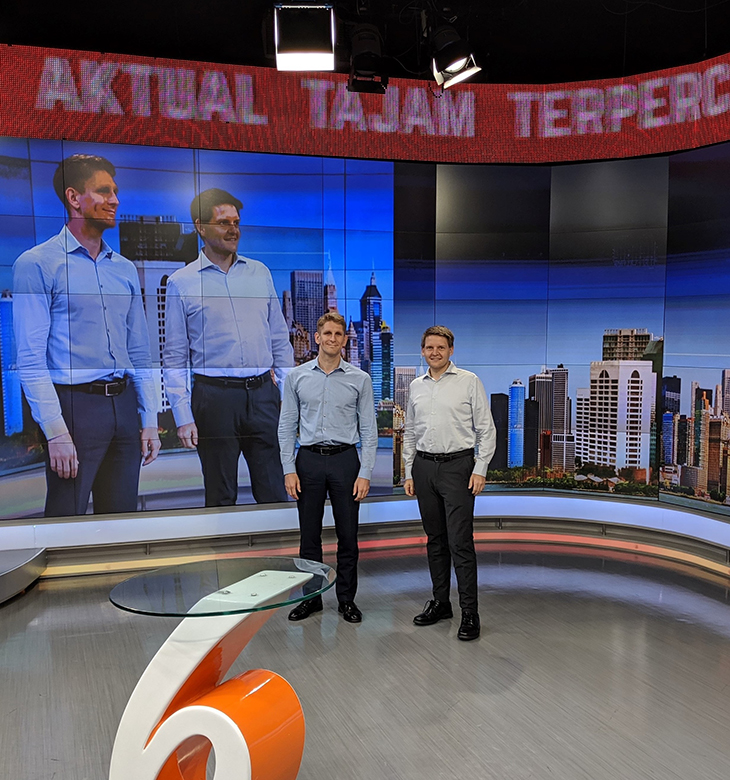 Touring the news studio of a €1.1b media business, our portfolio company's competitor
Touring the news studio of a €1.1b media business, our portfolio company's competitor
Meeting Warren Buffett
During our month-long stay in Indonesia, not only did we meet with the CEOs and senior management of 75 listed companies, but we also attended industry forums and met with the regulators and influential local business leaders, deepening our knowledge of the market.
A meeting with Bank Indonesia executives provided important insight into the Bank’s stance on supporting macroeconomic stability and the currency. Our discussion included an interesting point on poverty alleviation: the bank oversees and promotes electronic money distribution so that the currently unbanked population can have access to e-money, which is much easier to access than formal bank accounts, given the country’s dispersed geography of over 17,000 islands. The e-money growth is vast, and this partially contributed to our decision to invest in an e-money distribution company whose very low valuation looked unsubstantiated.
An interesting event we attended was the Capital Market Summit & Expo 2019, where we not only had the opportunity to gauge retail investors’ sentiment, but also met the “Warren Buffett of Indonesia” who kindly invited us to meet with him privately. He brought along a dozen friends that form an investment club; we learned about their approaches to value investing and discussed stocks they like. We find it valuable to meet not only with the companies we invest in, but also with the local investment community to better understand how they shape the market’s trading behavior.
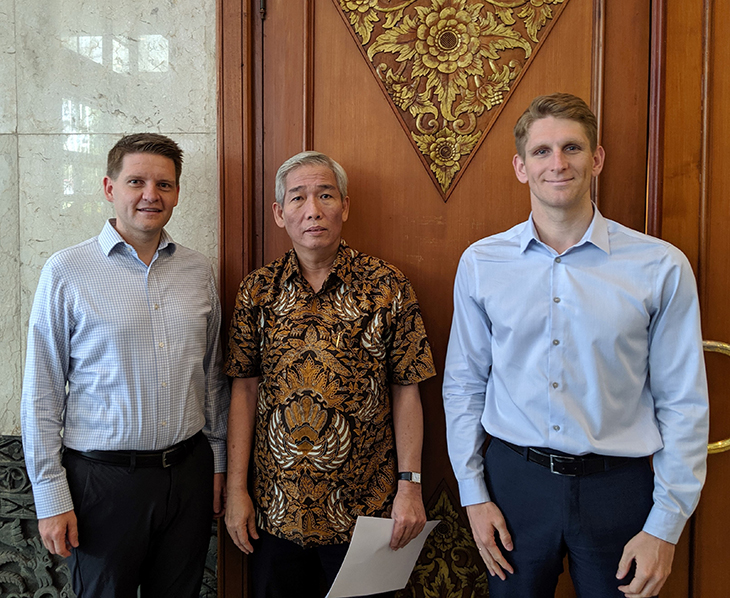 Burton Flynn and Ivan Nechunaev meeting with the “Warren Buffett of Indonesia”
Burton Flynn and Ivan Nechunaev meeting with the “Warren Buffett of Indonesia”
Alarmed by the risks posed by climate change
We also attended Indonesia’s largest annual geothermal convention at the invitation of a power company that is building out a robust renewable energy practice. Hearing from the senior policy-makers and business leaders about the country’s plans to advance sustainable energy production in lieu of fossil-fuel power gave us hope that Indonesia’s carbon emissions can be reduced in a long-term unified global effort to combat climate change.
If climate change progresses as it does now, infrastructure failures and natural disasters in Indonesia will be of tremendous scale, given that 50% of Jakarta’s territory is already below sea level, and the country’s capital city keeps sinking at a pace of up to 20 cm per year. Of note, during our month-long visit the president announced the move of the country’s capital to Kalimantan where a new city will be built from scratch to unload the congested Jakarta. We concur with this need, especially after spending a month under Jakarta’s umbrella of pollution which literally made our eyes water while running through the city on the weekends.
In every single company meeting, we ask a question: “In what ways does climate change, or the transition to a low-carbon economy, pose financial risks to your company?” We occasionally hear some coal companies, or other large carbon footprint businesses, acknowledge that they are increasingly having a hard time getting access to funding. But most companies we met with in Indonesia confidently said that their country is at least 20 years from implementing any regulations to transition to a low-carbon economy that would hurt them. While Indonesia is a laggard, we are skeptical that their predictions are accurate. We think the risk exposure is likely higher than what is currently priced in.
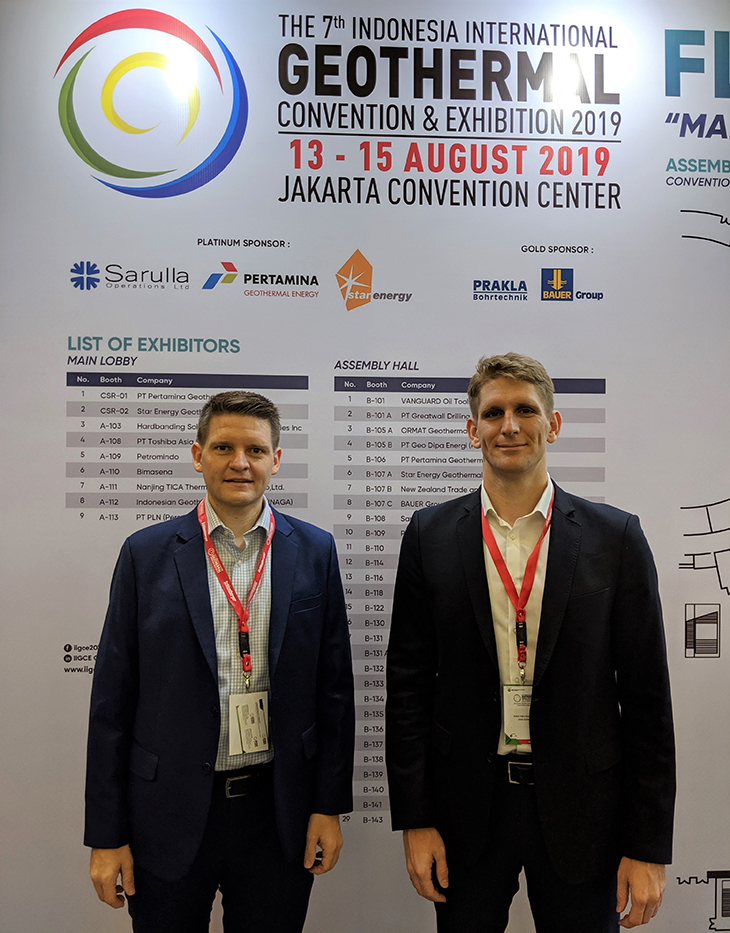 Attending an annual international geothermal convention in Jakarta
Attending an annual international geothermal convention in Jakarta
Enhancing our SOE governance framework
The state owns significant stakes in many of the listed companies in Indonesia. Having government as a controlling shareholder changes the investment dynamics, and we sought to better understand the risks and advantages of such a model from a minority shareholder perspective. As such, we met with the deputy minister for SOEs to explore how SOEs are run, what the state’s ownership plan is going forward, and what it means for foreign investors. On one hand, SOEs are often more stable businesses due to the government support they receive; however, on the other hand, it was confirmed that minority shareholders’ interests are not always taken into account by a large state owner. To further comprehend the SOE matter, we also met with a fellow Wharton alumnus, a CEO of one of the largest SOEs in the country, who confirmed much of the information we received from the SOE ministry.
We acknowledge that any SOE investments require additional analysis, and so we incorporated a relevant robust SOE section into our governance assessment framework. For example, we now consider whether there are government appointees on the board or in management positions, as well as what political and/or party objectives are being pursued through state ownership.
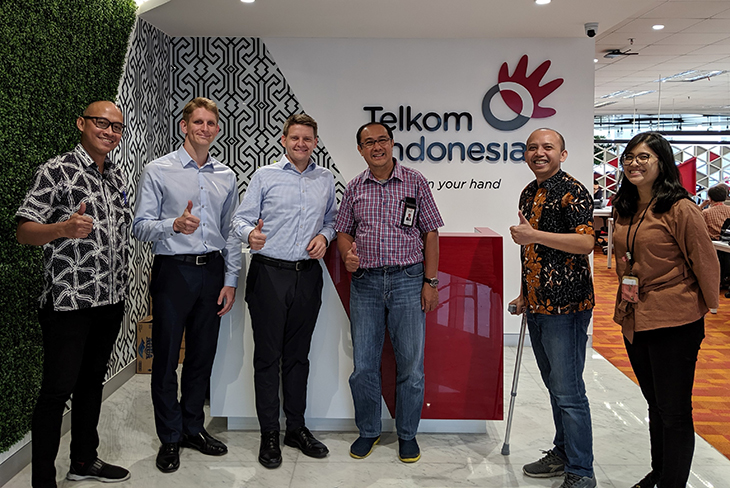 Meeting with a €25b majority-state-owned telecom company
Meeting with a €25b majority-state-owned telecom company
ESG anecdotes: entertaining and not so much
The more markets and companies we visit, the more anecdotes and curious observations we gather. Some of those, for good or bad, come from the ESG realm. Here are our favourites from Indonesia.
Take this one company for example – a cigarette manufacturer whose deputy CEO declared to us: "Health consciousness? I laugh in the face of health consciousness!" The same executive later mentioned questions they receive from investors regarding child labor: “Foreigners think we employ children to roll cigarettes, but we don’t – children are so inefficient in rolling cigarettes that it doesn’t even make economic sense.” This meeting, both funny and sad at the same time, reaffirms investors’ concerns about tobacco businesses’ social responsibility.
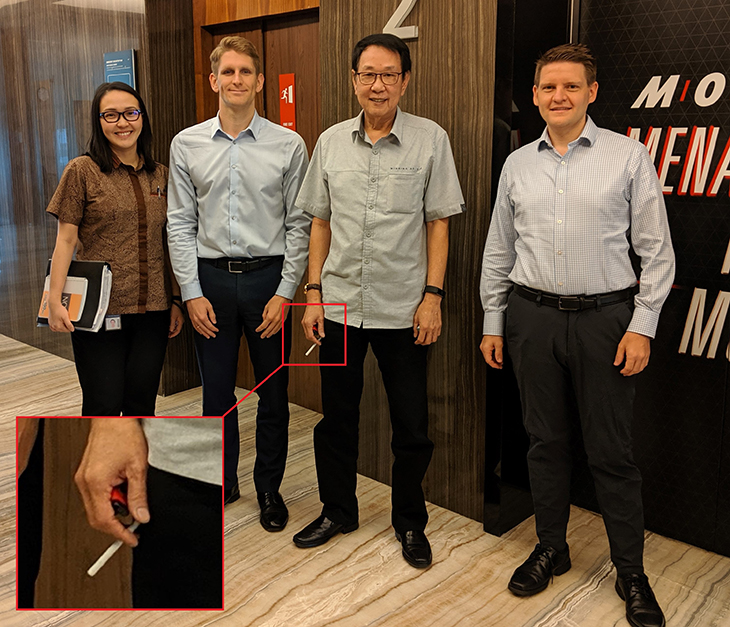 Meeting with a €6.5b cigarette manufacturer that “laughs in the face of health consciousness”
Meeting with a €6.5b cigarette manufacturer that “laughs in the face of health consciousness”
In another meeting, this time with a construction business, when asked whether their company had an ESG policy the confused investor relations manager tried to play it cool. He thought for a while and after conversing with his colleague in Bahasa for a minute finally proclaimed that they would need to get back to us after they "ask their operations team to calculate the ESG number.” While in most companies the IR professional knows the ESG policy better than anyone (including the CEO – sadly so), perhaps in this company ESG is the engineers’ prerogative. Humour aside, we are actually excited when we find such an opportunity to raise awareness about ESG.
The third anecdote comes from our meeting with a diversified food company that has received a lot of criticism for its palm oil issues in the recent years. The company helped us understand their side of the story by explaining the nuanced issues and accusations in deep detail. After the meeting, we were taking a picture with everyone attending the meeting when the head of investor relations suggested that we move to the side in order to position the noodles that the company produces at the center of the picture. We realized later that this move conveniently blocked the palm oil with our backs so that it didn’t make it into the picture!
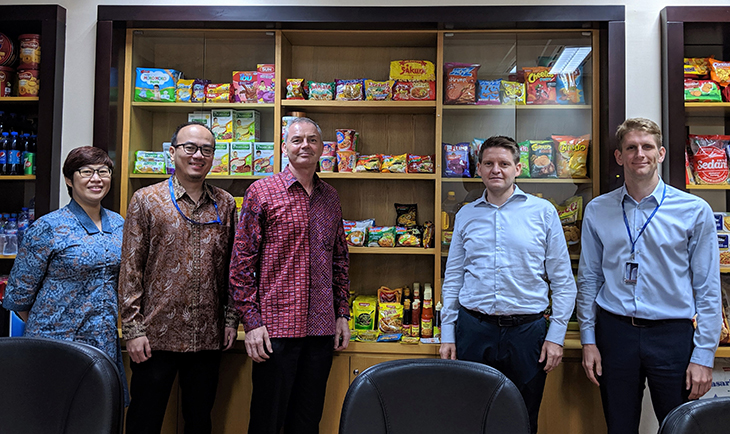 Meeting with a €4.5b food producer (and blocking palm oil out of the picture)
Meeting with a €4.5b food producer (and blocking palm oil out of the picture)
ESG leaders
While anecdotes happen and ensure a fair bit of entertainment, many companies we met in Indonesia were able to articulate sound sustainability practices which they take to the core of their operations. These companies understand that good ESG means better business efficiency, lower cost of capital, stronger risk management, more loyal customers, and happier, more productive employees.
One company, a $150m tire manufacturer, particularly impressed us with their approach to ESG. Not only do they align their operational objectives with specific UN SDGs (including responsible production and consumption, and sustainable cities and communities), they have also been a signatory to the UN Global Compact since 2016 (one of only 9 listed companies in Indonesia to have signed so far), and are currently working on publishing an annual sustainability report (which is not yet required by the regulators). Companies like this not only benefit from such sustainability measures in the long-term, they also lead by example, encouraging competitors and firms from other industries to be responsible and sustainable.
Another company, a taxi business that manages to successfully coexist with new entrants in the era of ride-hailing, is also noteworthy. The firm has a female CEO and is very active in female empowerment in Indonesia: for example, it helps its drivers’ spouses increase family income through special vocational training, and already has 300 female drivers. In addition, the company prides itself on having its cars run on liquified natural gas instead of diesel, and is planning to increasingly integrate electric vehicles in its fleet. The sophisticated training of drivers represents a competitive advantage for the company. We personally witnessed this as we had one driver go above and beyond to highly skillfully navigate the congested streets of Jakarta and do so with such an utmost respect and care for the passengers and the fellow drivers that we communicated it to the senior management of his company whom we met earlier. As a result, the driver was nominated for the driver-of-the-month award.
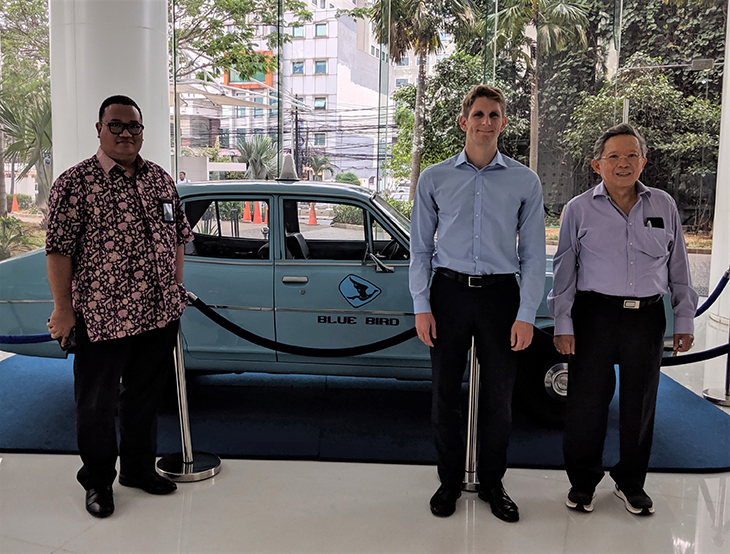 Meeting the founder of a €400m taxi business whose daughter now serves as the CEO
Meeting the founder of a €400m taxi business whose daughter now serves as the CEO
The third company profitably serves the unbanked segment through microfinance loans to underprivileged women. In their office, they proudly display a range of products which the women they serve make with the funding from the company. These women use the profits from their small businesses to provide for daily basic needs, pay for their children’s education, and improve their families’ living conditions. The company utilizes a poverty scorecard, which finds that each cycle of funding increases the chances that school-aged children attend school, the family has some kind of toilet, and the main cooking fuel is gas or electricity as opposed to firewood or coal. The 23 million women in the segment the company targets represent a huge growth opportunity from the already-impressive 3.6 million they currently serve.
We enjoy finding such firms that are making a real impact on underserved populations which would otherwise lack access to the most basic resources. These impact-driven companies do business in a sustainable and profitable way, and the critical KPIs they monitor are doing good (social impact) and doing well (financial performance).
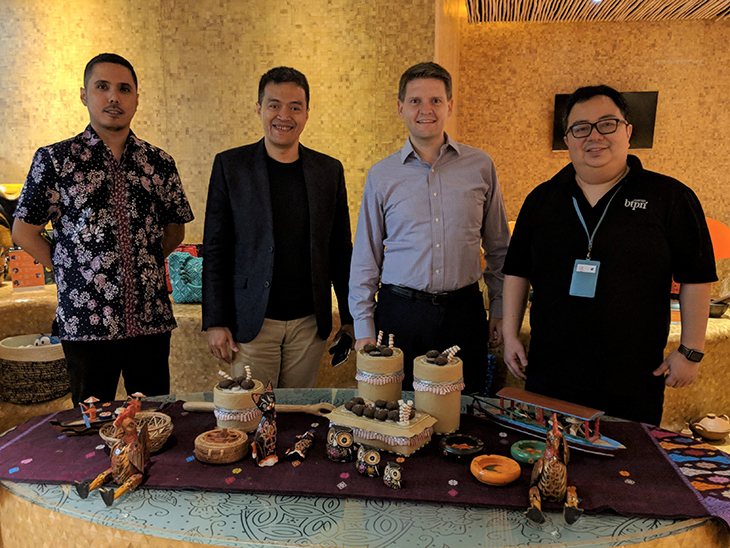 Meeting with a €1.5b microfinance business focused on serving underprivileged women (in front are products made by women thanks to loans from the company)
Meeting with a €1.5b microfinance business focused on serving underprivileged women (in front are products made by women thanks to loans from the company)
A nuanced approach to ESG
Some readers may wonder why ESG-minded investors would visit coal, palm oil or tobacco businesses? The answer is because we want to help companies improve their sustainability practices and generate a more positive impact on society and the planet, and we think that we would be missing a huge opportunity by only meeting with the cleanest and ESG award-winning companies while skipping those that harm people's health, mistreat stakeholders, and damage the environment. We may not invest in the laggards, but we aim to stimulate their thinking and provoke ESG improvements. We take a nuanced approach, but we always think critically about whether cheap valuations will ever get re-rated without substantial sustainability improvements.
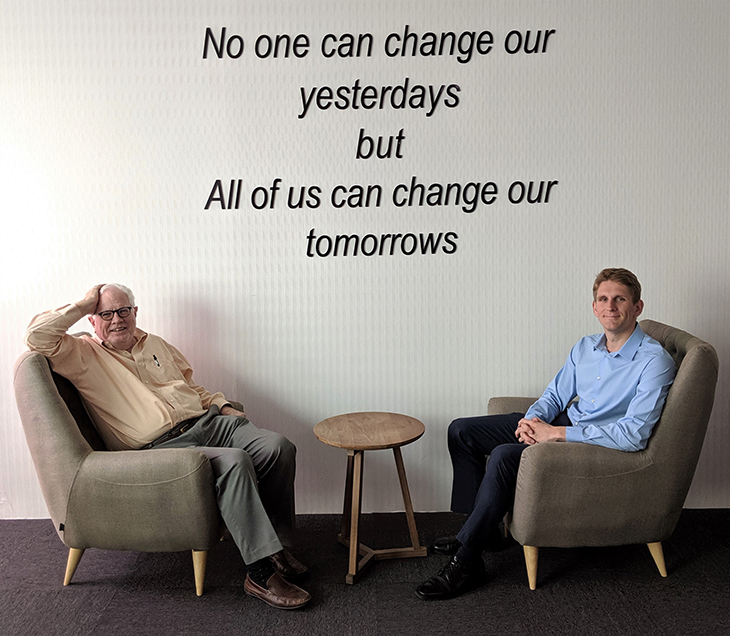 Meeting with a €150m renewable energy company
Meeting with a €150m renewable energy company
Our next stop
Having spent a month in the Philippines, Malaysia and Indonesia, we are departing to the fourth country in our effort to live in 12 emerging markets in 12 months. Stay tuned for... Bangladesh.
Learn more about our Evli Emerging Frontier Fund
Our recent blogs
A month in Malaysia: Finding another gem on "Treasure Island"
A month in the Philippines: How active management helped us beat the traffic (and the market)















